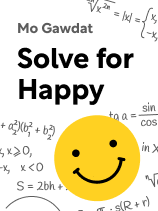

This article is an excerpt from the Shortform book guide to "Solve for Happy" by Mo Gawdat. Shortform has the world's best summaries and analyses of books you should be reading.
Like this article? Sign up for a free trial here.
How does your brain filter information? How does that mental filtering affect your outlook?
Your brain struggles to handle all of the information it takes in. It has to sift out some data. The way it filters impacts your perceptions and ultimately your happiness.
Continue reading to understand how mental filtering works and discover what you can do about it.
Mental Filtering
One weakness that keeps us from being happy stems from the overwhelming amount of information available to our brains. At any given moment, we’re inundated with sensory stimuli like sounds, tastes, scents, and colors. Most of this information is irrelevant to making decisions, so our brains filter it out and only process the relevant information.
(Shortform note: A part of the brain called the thalamus plays a key role in this mental filtering. As information travels from sensory neurons to the cerebral cortex, which is responsible for high-level processes like learning and decision-making, it passes through the thalamus. To facilitate this journey, there are reciprocal connections between the thalamus and the cerebral cortex; whenever the cortex prioritizes incoming information, it relays a message to the thalamus, blocking it from processing other “irrelevant” information.)
Yet, since our brain arose to ensure our survival, Gawdat observes that it focuses on negative information—that is, information that constitutes a threat. Consequently, it filters out positive information. For example, if you’re hiking and you start to become hungry, your brain might overemphasize your hunger while filtering out the beauty of your surroundings.
(Shortform note: Our brain’s higher sensitivity to negative information also influences our romantic relationships, as we place greater weight on negative than positive experiences in relationships. To compensate, experts suggest that healthy marriages require a five-to-one ratio of positive to negative experiences. Any less, and marriages grow more likely to end in divorce.)
To repair this weakness, remind yourself that your brain filters out most available information. In turn, you can focus on uncovering positive information that your brain has kept hidden.
(Shortform note: Experts recommend myriad strategies to train yourself to emphasize positive information, such as memorizing lists of positive words to prime your brain to have positive ideas.)

———End of Preview———
Like what you just read? Read the rest of the world's best book summary and analysis of Mo Gawdat's "Solve for Happy" at Shortform.
Here's what you'll find in our full Solve for Happy summary:
- The six misconceptions that cause us to suffer
- How to remove the seven weaknesses that hinder your happiness
- The five pillars to becoming permanently happy






